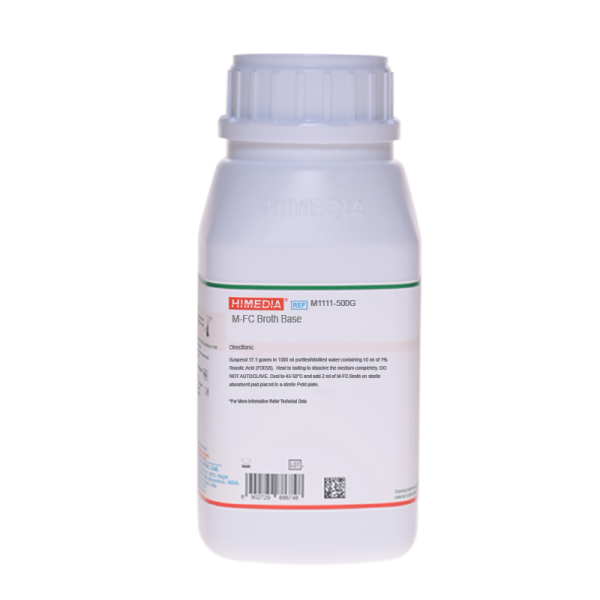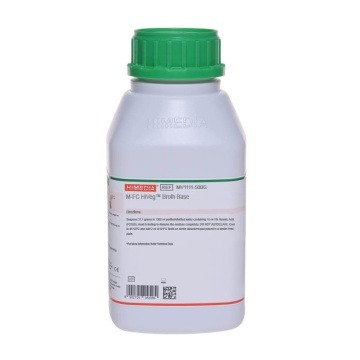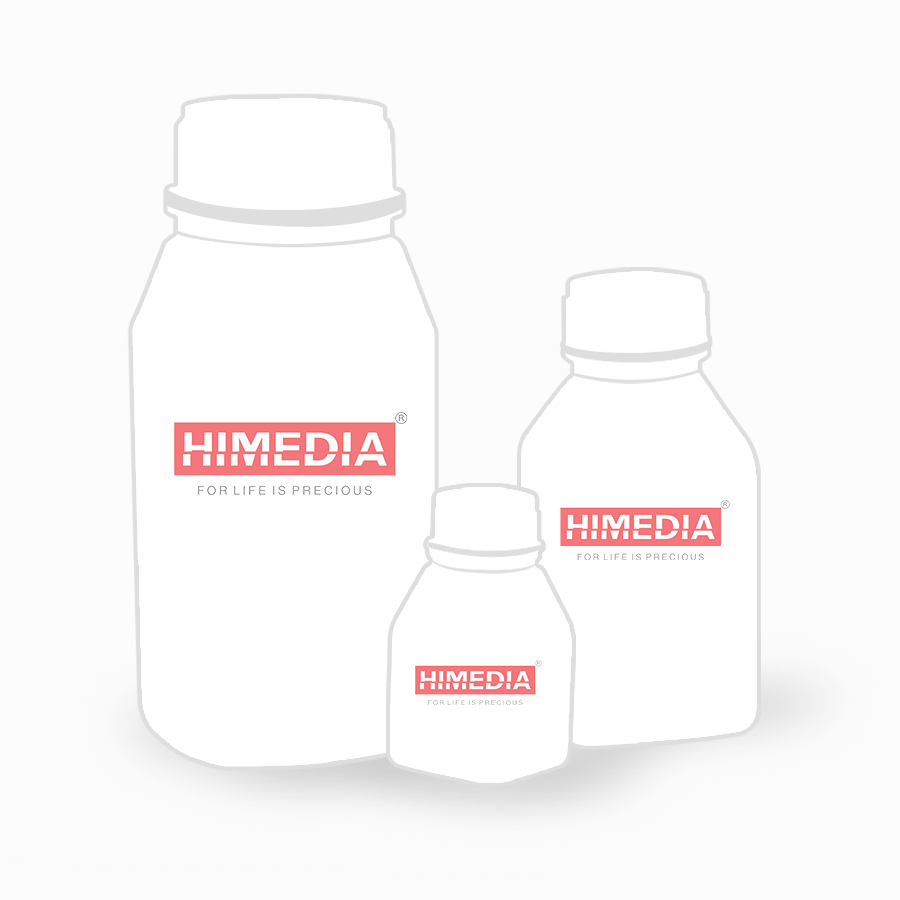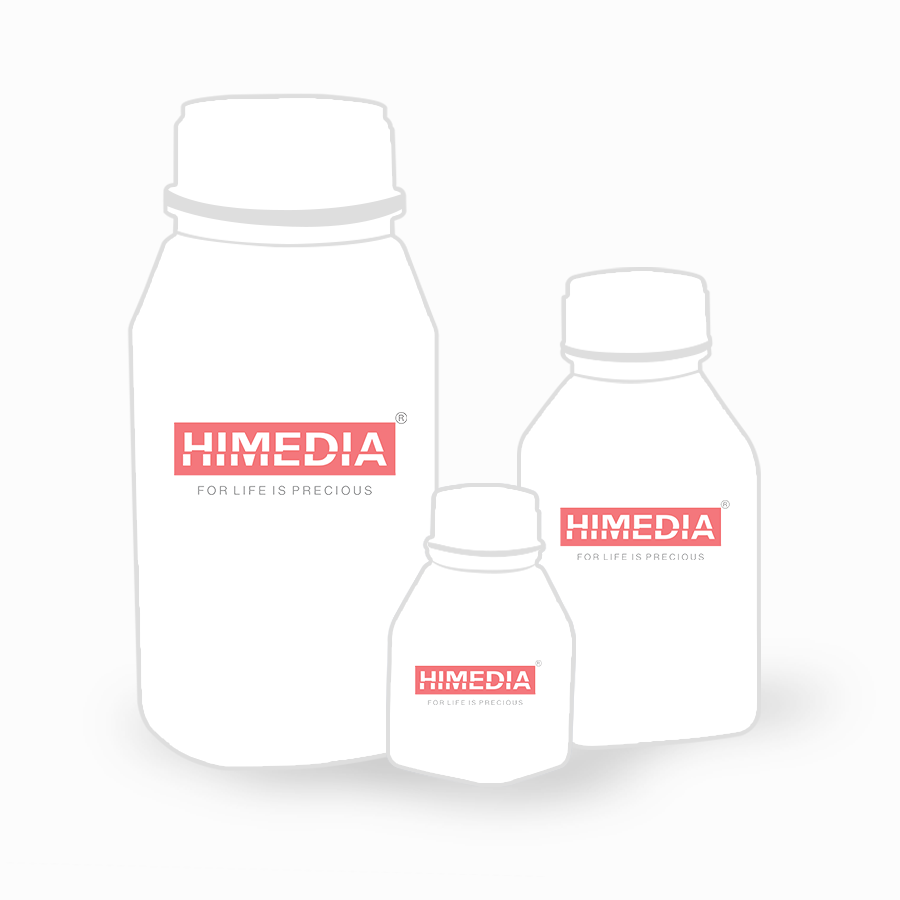 Your enquiry has been submitted
Your enquiry has been submitted
M-FC Broth Base
Intended Use
Recommended for the detection and enumeration of faecal coliforms using membrane filter technique at higher temperature (44.5°C).
Composition
| Ingredients | g/L |
|---|---|
| Tryptose | 10.000 |
| Proteose peptone | 5.000 |
| Yeast extract | 3.000 |
| Lactose | 12.500 |
| Bile salts mixture | 1.500 |
| Sodium chloride | 5.000 |
| Aniline blue | 0.100 |
| Final pH (at 25°C) | 7.4±0.2 |
**Formula adjusted, standardized to suit performance parameters
Directions
Suspend 37.1 grams in 1000 ml purified/distilled water containing 10 ml of 1% Rosolic Acid (FD058). Heat to boiling to dissolve the medium completely. DO NOT AUTOCLAVE. Cool to 45-50°C and add 2 ml of M-FC Broth on sterile absorbent pad placed in a sterile Petri plate.
Principle And Interpretation
M-FC Broth Base, designed by Geldreich et al (1) is used for the detection and enumeration of faecal coliforms using the membrane filter technique. This medium is based on the property of faecal coliforms to grow at 44-45°C (2). M-FC Broth Base is recommended by APHA (3) and by various other standards for detection of faecal coliforms (4,5,6). APHA recommends the membrane filtration procedure and delayed incubation for faecal coliforms.
Proteose peptone, tryptose and yeast extract provide necessary nutrients for the growth of faecal coliforms. Lactose is the carbon source as well as fermentable carbohydrate in the medium. Bile salts inhibit the growth of contaminating gram-positive microorganisms. Aniline blue is a triphenyl methane dye which suppresses the growth of many gram-positive microorganisms. Aniline blue along with rosolic acid forms he indicator system of the medium.
Type of specimen
Water samples
Specimen Collection and Handling
Sterile cotton absorbent cotton pads are saturated with M-FC Broth Base by addition of 2 ml medium. Membrane filters, through which water sample is passed, are aseptically placed onto sterile cotton absorbent cotton pads saturated with M-FC Broth Base. If total coliforms are to be estimated, incubation is carried out at 35-37°C whereas if faecal coliform count is to be estimated, incubation is done at 44-45°C. Coliforms will form blue colonies whereas non-coliforms will form gray coloured colonies on M-FC Broth Base.
After use, contaminated materials must be sterilized by autoclaving before discarding.
Warning and Precautions
Read the label before opening the container. Wear protective gloves/protective clothing/eye protection/face protection. Follow good microbiological lab practices while handling specimens and culture. Standard precautions as per established guidelines should be followed while handling specimens. Safety guidelines may be referred in individual safety data sheets.
Limitations
- Further biochemical testing is required for identification of species.
- Individual organisms differ in their growth requirement and may show variable growth patterns on the medium.
- Each lot of the medium has been tested for the organisms specified on the COA. It is recommended to users to validate the medium for any specific microorganism other than mentioned in the COA based on the user's unique requirement.
Performance and Evaluation
Performance of the medium is expected when used as per the direction on the label within the expiry period when stored at recommended temperature.
Quality Control
Appearance
Light yellow to bluish grey homogeneous free flowing powder
Colour and Clarity of prepared medium
After Addition of 1% Rosolic Acid: Red coloured clear to slightly opalescent solution in tubes
Reaction
Reaction of 3.71% w/v aqueous solution at 25°C. pH: 7.4±0.2
pH
7.20-7.60
Cultural Response
Cultural characteristics observed with added Rosolic acid (FD058) after an incubation at different temperatures for 22-24 hours.
| Organism | Inoculum (CFU) | Growth at 35-37°C | Growth at 45.5°C | Colour of colony (on membrane filter) |
|---|---|---|---|---|
| Enterococcus faecalis ATCC 29212 (00087*) | >=104 | inhibited | inhibited | |
| Escherichia coli ATCC 25922 (00013*) | 50-100 | luxuriant | luxuriant | light blue |
| Salmonella Typhimurium ATCC 14028 (00031*) | 50-100 | luxuriant | inhibited | pinkish |
| Shigella flexneri ATCC 12022 (00126*) | 50-100 | luxuriant | inhibited | pinkish |
Key: *Corresponding WDCM numbers.
Storage and Shelf Life
Store between 10-30°C in a tightly closed container and the prepared medium at 15-25°C. Use before expiry date on the label. On opening, product should be properly stored dry, after tightly capping the bottle inorder to prevent lump formation due to the hygroscopic nature of the product. Improper storage of the product may lead to lump formation. Store in dry ventilated area protected from extremes of temperature and sources of ignition. Seal the container tightly after use. Product performance is best if used within stated expiry period.
Disposal
User must ensure safe disposal by autoclaving and/or incineration of used or unusable preparations of this product. Follow established laboratory procedures in disposing of infectious materials and material that comes into contact with sample must be decontaminated and disposed of in accordance with current laboratory techniques (7,8).
Reference
- Geldreich E. E., Clark H. F., Huff E. E. and Bert M., 1965, J. Am. Water Works Assoc., 57:208.
- Collee J. G., Fraser A. G., Marmion B. P., Simmons A., (Eds.) Mackie and McCartney, Practical Medical Microbiology, 1996, 14th Edition, Churchill Livingstone.
- Lipps WC, Braun-Howland EB, Baxter TE, eds. Standard methods for the Examination of Water and Wastewater, 24th ed. Washington DC:APHA Press; 2023.
- Bordner R. H., Winter J. A. and Scarpino P. V. (Eds.), 1978, EPA-600/8-78-017, Environmental Monitoring and Support Laboratory, Office of Research and Development, U.S. Environmental Protection Agency, Cincinnati, Ohio.
- Official Methods of Analysis of AOAC International, 2000, 17th Ed., AOAC International, Gaithersburg, Md.
- U.S. Environmental Protection Agency, 1992, EPA-814B-92-2002, Office of Ground Water and Technical Support Division, USEPA, Cincinnati, Ohio.
- Isenberg, H.D. Clinical Microbiology Procedures Handbook 2nd Edition.
- Jorgensen, J.H., Pfaller, M.A., Carroll, K.C., Funke, G., Landry, M.L., Richter, S.S and Warnock., D.W. (2015) Manual of Clinical Microbiology, 11th Edition. Vol. 1.
| Product Name | M-FC Broth Base |
|---|---|
| SKU | M1111 |
| Product Type | Regular |
| Physical Form | Powder |
| Origin | Animal |
| Packaging type | HDPE |
| References | 1. Collee J. G., Fraser A. G., Marmion B. P., Simmons A., (Eds.) Mackie and McCartney, Practical Medical Microbiology,1996, 14th Edition, Churchill Livingstone. |
| Customized Product Available | No |







